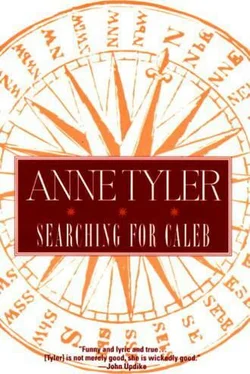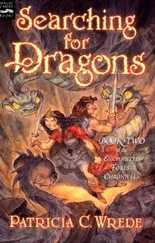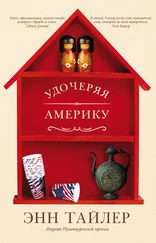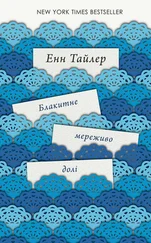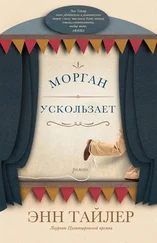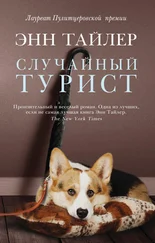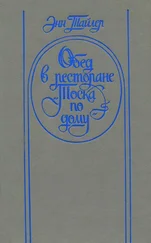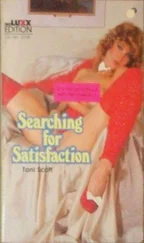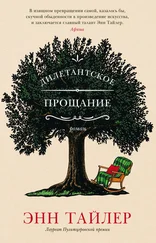“Six two.”
“Double rice for Duncan, Nana!”
The old lady shoveled a mountain onto Duncan’s plate.
“Rice prevents heart attacks, stroke, and impotence,” said Alonzo.
“It’s the thiamine,” said Duncan.
“More slivovitz?”
“Oh, I might as well.”
Justine ate everything she was given and accepted seconds and thirds, egged on by the approving eye of the old lady who stood behind Alonzo’s chair with her hands folded under her apron. Alonzo and Duncan mainly drank, though Alonzo outdistanced Duncan very early and even managed to work in a few slabs of bread stuffed with meat and rice, meanwhile talking steadily. “When I heard you were moving back to Maryland I thought, well then, I can wait. I was contemplating a certain action. But we’ll go into that later. I had been thinking, now how will I reach Justine? Then I got your card. It came as a great relief to me.”
He leaned back and laced his hands across his stomach, his face a buttery color in the light of the tent. Alonzo was a happy man but forever complaining, as if hoping to fool any jealous gods. Although he loved his carnival business he said that only a fool would stick with it. “Imagine,” he always said, “some people suppose this life to be romantic, dancing around the wagons at night. If they were only in my boots! You need to be a mechanic, a lawyer, an accountant. It’s all the assembling and disassembling of machinery, and repairs and insurance payments. I’m being robbed by my insurance agency. Disability and liability and major medical and fire and theft and acts of God. Then there is the social security, a headache in itself when you consider all these employees coming and going and the pregnancies and the girls deciding to finish school. And you have to negotiate in every town, some don’t allow so much as a ring-the-bottle game, and there’s the safety inspectors and the police and the church that wants to put a tray of cupcakes in your hot dog stand . . . ”
It was Duncan he talked to; men were best for discussing business. But it was Justine he took away with him at the end of the meal, one large warm thumb and forefinger gripping her upper arm. “May I?” he asked Duncan. “Only long enough to say when I’ll become a millionaire.”
Duncan said, “Do you still have your mechanic?”
“Lem? Would I be here if I didn’t? He’s in the purple trailer. He knew you were coming; go right in.”
Alonzo walked with his head down, still holding Justine’s arm. “You must excuse the state of my place,” he said. “I have too many people in it now. My wife has left me but one of her children stayed behind to keep me company. And also Bobby. You’ve met Bobby, my stepson. Actually my fourth wife’s stepson, her ex-husband’s boy by a woman from Tampa, Florida. Would you care for Turkish coffee?”
“No, thank you,” said Justine, and she stepped inside the little green trailer. Although it was crowded it was neater than her own house, with pots and pans arranged in rows in the tiny kitchen and account books stacked at one end of the corduroy daybed. There was a coffee table that had a stripped look, as if he had just recently cleared it. He smoothed it now with both hands. “For the cards,” he said.
“Thank you,” said Justine.
She sat down on the daybed. She removed her crumb-littered coat, although even here it was cold. From her carry-all she took the cards in their square of silk.
“Where did you get the silk?” Alonzo asked. (He always did.)
“They came with the cards,” she said, unwrapping them. She shuffled them several times, looking off at the blue air outside the trailer window.
“And where did you get the cards?”
“Cut the deck, please.”
He cut it. He sat down across from her and looked at her soberly from under curled black brows, as if his future might be read in her face.
Justine first met Alonzo Divich at a church bazaar in 1956, when she was telling fortunes in the Sunday school basement. She was with the white elephants and the potted plants; his carnival was outside. He came in to have his cards read. He was one of those people, she saw, who are addicted to outguessing their futures. Whenever he had an hour to kill, a layover in some town or a lull in his work, he would search out the local seeress. If there were five local seeresses, fine. He would go to all five. He would listen without even breathing. He had heard his fortune, he told Justine, from well over a thousand women, and it had not once been done right. He had not only had his cards read but also his palms, his skull, his moles, his fingernails, his dreams, his handwriting, his tea leaves and coffee grounds. He had been to astrologers and physiognomists, not to mention specialists in bibliomancy, clidomancy, crystal-gazing, and ouija boards. A lady in Montgomery County had set a gamecock to pick corn from a circle of letters; a Georgia woman studied smoke rising from a fire and another dropped melted wax into cold water, forming small nubbly objects that she claimed to be able to interpret. In York County, Pennsylvania, he had had to bake his own barley cakes, which were then broken open and examined under a magnifying glass. And in a marsh near St. Elmo, Alabama, a very old woman had offered to kill a rice rat and study its entrails, but he had felt that such an act might bring bad luck.
He had told Justine all this at once, leaning toward her across the table in her curtained booth while a line of church ladies waited their turns outside. Justine, although she did not know it, wore the tolerant, disillusioned expression of a doctor hearing that his new patient has been to forty other doctors before him, none of them satisfactory. It gave her a look of wisdom. Alonzo decided she was going to turn out to be special. “Lady,” he had said, setting his palms on her table, “tell me the answer to my problem. I feel you can.”
“What is your problem?”
“Don’t you know?”
“How should I?”
“ You’re the fortune teller.”
So Justine had to give the speech she had made more often than she could count, and would make many times again, sometimes even to him. “Now I am not a mind reader,” she said, “and I have no way at all of guessing what you want to ask, or where you come from or anything else about your past. I read the future. I have a talent for predicting change. If you help me we can search for an answer together; but I’m not going to outwit you.”
“My problem is this,” Alonzo said instantly.
And he sat on a Sunday school chair and took his hat off — a sudden, changeable man, all black and bright and multicolored like a fire that could leap in any direction at any second. “My name is Alonzo Divich,” he told her. “I own a carnival business.” He jabbed a thumb at the merry-go-round music above them, “The St. James Infirmary Blues” spinning itself out among the cries of children and hot dog vendors, and teenagers clinging to the Tilt-A-Whirl. “I’m divorced, I have this kid. Now I’ve met a rich widow woman who wants to marry me. She likes the kid, too. She would even live in the trailer. I don’t have to change one thing in my life for her. And I’m a marrying fool. I love being married, I tried it twice before. So what’s the trouble? The same day we start the talk about a wedding, exact same day, a man I used to know calls and asks me to come and prospect for gold with him beside a lake in Michigan. He says he’s onto something. He’s going to be a wealthy man, and so am I. But of course there’s the kid, and the mortgaged machines, and the woman who doesn’t like Michigan. So which do I do?”
Justine was listening with her mouth open. When he finished she said, immediately, “Go look for gold.”
Читать дальше
